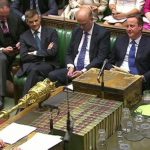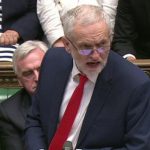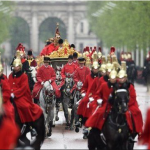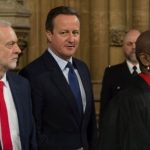Queen’s Speech: Prison shake-up at heart of new laws
The government’s planned new laws have been set out by the Queen – including the biggest prison shake-up in England and Wales “since Victorian times”.
Satellite-tagged inmates could be sent home on weekdays and re-offending league tables will be published.
The 21-Bill agenda also includes support for a spaceport and driverless cars – but a planned British Bill of Rights has been put on hold.
David Cameron called it “a One Nation speech from a One Nation government”.
But Labour leader Jeremy Corbyn, giving his response in the Commons, accused Mr Cameron of turning a blind eye to the “consequences” of cuts to public services, branding his government a “driverless car heading in the wrong direction”.
He added: “This government is failing to deliver an economy that meets the needs and aspirations of the people that sent us here – a government that is consistently failing to meet its own economic targets.
“They have failed on the deficit, failed on the debt, failed on productivity, failed to rebalance the economy.”
The Queen’s Speech is being seen as an attempt to secure a legacy of social reform for the prime minister but critics say it will be overshadowed by 23 June’s referendum on whether Britain should remain in the EU, which has split the Cabinet.
Announcing Mr Cameron’s programme from her throne in the House of Lords, the Queen said: “My government will use the opportunity of a strengthening economy to deliver security for working people, to increase life chances for the most disadvantaged and to strengthen national defences.”
The Queen’s Speech is the centrepiece of the State Opening of Parliament, a tradition that can be traced back to 1536.
Other measures in the Speech include:
Plans to force every school in England to become an academy have been ditched – instead the Education for All Bill proposes “moving towards a system where every school is an academy” starting with those in the “worst performing local authorities”
Improving opportunities for children in care and speeding up permanent adoption in England
Supporting for the development of spaceplanes and commercial spaceports, although the location of the first one has not been named
Promoting the development of driverless cars – including ensuring “appropriate insurance” is available for them
Spreading the use of drones by businesses and individuals
The government will require pornographic websites to verify users are over 18
Proposals to recoup money from foreign nationals using the NHS
A legal right to fast broadband connections for every household
A tax on sugary soft drinks from April 2018
Plans to better protect pensions savings
The government is also pushing ahead with controversial plans to monitor internet use through its Investigatory Powers Bill and crack down on extremism, including stronger powers to disrupt radicals’ activities and to intervene in unregulated schools which are “teaching hate”.
The planned prison reforms, drawn up by Justice Secretary and leading Leave campaigner Michael Gove, are being billed as the centrepiece of the Speech.
In a statement released as the Queen delivered her address, Mr Cameron said: “Because this government sees the potential in everyone, we finally undertake the long-overdue change that our prisons need.
“No longer will they be warehouses for criminals, we want them to be incubators of changed and reformed lives.”
Analysis
The QueenImage copyrightGETTY IMAGES
By BBC Political Correspondent Tom Bateman
This is a moment when Mr Cameron can ill afford controversies over planned legislation or public spats with his own backbenchers threatening to rebel over upcoming bills.
It is striking that some of the most heavily-trailed parts of the Queen’s Speech are those that have the effect of promoting the government’s desire to be seen as compassionate.
The programme sees legislation introduced “to tackle some of the deepest social problems in society, and improve life chances”.
The prominence given to these announcements follows a series of damaging climb downs in which critics accused ministers of having to be forced to take the compassionate argument in the face of threatened backbench rebellions.
Read Tom’s full analysis
One of Europe’s biggest jails, HMP Wandsworth, is among six institutions where governors will be given new powers over budgets and setting the daily regime.
Satellite tracking tags which monitor the movements of offenders using GPS technology will be piloted in eight police areas from September, in a move which could see prisoners become weekend inmates and spend the rest of the week at home as they hold down jobs.
Prisons will also be forced to publish statistics on education, reoffending and inmates’ employment on release.
According to The Guardian, the government will also adopt the findings of a review of education in prisons, which will recommend allowing inmates to use iPads in their cells to “learn independently” and stay in touch with friends and family via Skype.
BBC Political Editor Laura Kuenssberg said this was being seen by Mr Cameron as his “big moment” to do something about the “life chances” of people normally ignored by politics.
But the government was still pre-occupied with the EU referendum and the fear that “if they don’t win David Cameron might not be prime minister in six or seven weeks’ time”, she added.
The Queen made only the briefest of direct references to her government holding “a referendum on membership of the European Union”.
But – in a move that may be seen as an attempt to reassure voters ahead of the EU referendum – she added: “My ministers will uphold the sovereignty of Parliament and the primacy of the House of Commons.”
But former minister and Leave campaigner Iain Duncan Smith accused the government of abandoning plans for a Sovereignty Bill, promised earlier this year, to reassert the supremacy of the UK Parliament.
‘Ragbag of proposals’
The former Work and Pensions Secretary accused David Cameron of “jettisoning or watering down” key elements of legislation in a “helter-skelter pursuit” to win the EU referendum.
He said: “It appears the much-vaunted Sovereignty Bill, key to the argument that the PM had secured a reform of the EU, has been tossed aside.
“The fear in government must be that as no one in Britain buys the idea that the EU has been reformed, the Sovereignty Bill would draw the public’s attention back to that failure.”
SNP MP Joanna Cherry told BBC News the Queen’s Speech was a “ragbag of proposals” many of which had been “recycled from last year” and there was nothing in it to help low income families “struggling to make ends meet”.
UKIP deputy leader Paul Nuttall described the Queen’s Speech as “light on major announcements,” adding that some Conservative MPs had been “convinced to support Cameron’s decision to support the ‘Remain’ side by promises of a Sovereignty Bill, and they must now feel utterly betrayed by the man they’re whipped into cheerleading”.
IMAGES:
The Queen speaks to Chris Grayling and Michael Gove Image copyright GETTY
Jeremy Corbyn and David Cameron Image copyright GETTY IMAGES
Image caption
Jeremy Corbyn and David Cameron head through to the Lords for the Queen’s Speech
Jeremy Corbyn Image copyright PARLIAMENT
Jeremy Corbyn spoke for more than 40 minutes in the Commons without taking interventions
David Cameron reacts to Jeremy Corbyn speech Image copyright PARLIAMENT
Image caption
The Conservative front bench listen to Jeremy Corbyn’s speech
For more on this story and video go to: http://www.bbc.com/news/uk-politics-36318353










